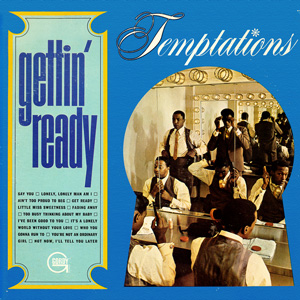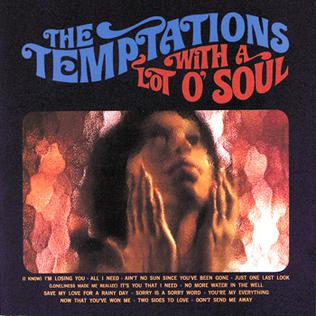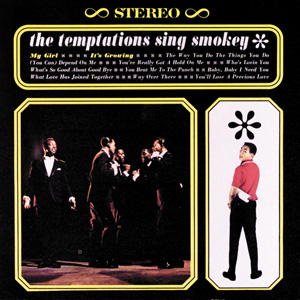
The Temptations are an American vocal group from Detroit, Michigan, who released a series of successful singles and albums with Motown Records during the 1960s and 1970s. The group's work with producer Norman Whitfield, beginning with the Top 10 hit single "Cloud Nine" in October 1968, pioneered psychedelic soul, and was significant in the evolution of R&B and soul music. The band members are known for their choreography, distinct harmonies, and dress style. Having sold tens of millions of albums, the Temptations are among the most successful groups in popular music.

Psychedelic Shack is the twelfth studio album by The Temptations for the Gordy (Motown) label released in 1970, which represents the Temptations' full-blown submergence into psychedelia. Completely written by Norman Whitfield and Barrett Strong and produced by Whitfield, Psychedelic Shack almost completely abandoned the "Motown Sound" formula for this LP; hard rock guitars, synthesizer sound effects, multitracked drums, and stereo-shifting vocals giving most of the album's songs a harder, less traditional feel than the Temptations' previous work.

The Temptations is a four-hour television miniseries broadcast in two-hour halves on NBC, based upon the history of one of Motown's longest-lived acts, The Temptations. Executive produced by former Motown executive Suzanne de Passe, produced by Otis Williams and Temptations manager Shelley Berger, and based upon Williams’ Temptations autobiography, the miniseries was originally broadcast on November 1 and November 2, 1998. It was filmed on location in Pittsburgh, Pennsylvania, in the spring of 1998. Allan Arkush directed the miniseries.

Meet the Temptations is the debut studio album by the Temptations for the Gordy (Motown) label released in 1964. It includes most of the group's early singles, excluding only the first, "Oh Mother of Mine", and its b-side, "Romance Without Finance" ; as well as the single "Mind Over Matter", in which the group is credited as The Pirates. The album consists entirely of previously released singles, including the group's first hit single, "The Way You Do the Things You Do".

Gettin' Ready is the fourth studio album by The Temptations for the Gordy (Motown) label released in 1966. It marks the transition of the group from having Smokey Robinson as its main producer, with new producer Norman Whitfield taking over Robinson's position. Two #1 R&B hit singles, one from each producer, are included: "Get Ready" from Robinson with Eddie Kendricks on lead, and "Ain't Too Proud to Beg" from Whitfield with David Ruffin on lead. Also included is the original version of "Too Busy Thinking About My Baby", which would be rerecorded as a hit for Marvin Gaye in 1969. The album was also one of the last albums to contain tracks co-authored by members of the group until the release of The Temptations Do The Temptations (1976). As with previous Temptations albums, several songs are written by members of The Miracles: Smokey Robinson, Bobby Rogers, Pete Moore, Ronnie White, and Marv Tarplin.

The Temptations in a Mellow Mood is the sixth studio album by The Temptations for the Motown label released in 1967. Composed primarily of pop standards such as "Ol' Man River" and "For Once in My Life", and similar songs written by Holland-Dozier-Holland and other Motown staff songwriters, the Mellow Mood album was part of Motown chief Berry Gordy's crossover plans for the group. Gordy wanted the Temptations, already the most popular male group among black audiences, to attract a large white fanbase and be able to secure playdates at supper clubs like the Copacabana, where the group had first performed in the summer of 1967.

Greatest Hits II is a 1970 greatest hits album for The Temptations, released by the Gordy (Motown) label. The sequel to the first Temptations greatest hits LP from 1966, Greatest Hits II collects several of the late-1960s hits that followed the release of the first compilation. Included here are the final collection of David Ruffin-led singles, including "(I Know) I'm Losing You", "I Wish It Would Rain" and "I Could Never Love Another ", and the first of the Dennis Edwards-led psychedelic soul records, including "Cloud Nine" and "Psychedelic Shack". A new non-album single, the #3 hit "Ball of Confusion ", is also included.

The Temptations with a Lot o' Soul is the fifth studio album by The Temptations for the Gordy (Motown) label released in 1967. Featuring four hit singles, With a Lot o' Soul is the most successful Temptations album from their "classic 5" era, during which David Ruffin, Eddie Kendricks, Paul Williams, Melvin Franklin, and Otis Williams constituted the Temptations' lineup.

The Temptations Sing Smokey is the second studio album by The Temptations for the Motown label, released on the Gordy Records subsidiary in 1965. As its name implies, it is composed entirely of songs written and produced by Smokey Robinson, and several other members of the Miracles as well.

The Temptations Christmas Card is a 1970 Christmas album by The Temptations for the Gordy (Motown) label. The album was released on October 30, 1970. It's also the group's first holiday release, it features each Temptation leading on various popular Christmas standards and original Christmas songs.
"Cloud Nine" is a 1968 hit single recorded by The Temptations for the Motown label. It was the first of their singles to feature Dennis Edwards instead of David Ruffin in the lineup, was the first of producer Norman Whitfield's psychedelic soul tracks, and won Motown its first Grammy Award. The song was written by Whitfield and former Motown artist Barrett Strong.
"I Want a Love I Can See" is a 1963 single by The Temptations for the Gordy (Motown) label. The single was the group's first A-side to be written and produced by Miracles lead singer Smokey Robinson. Robinson had previously written the B-side "Slow Down Heart", but for over the past year Berry Gordy, Jr. had been The Temptations' main producer.
"(You're My) Dream Come True" is a 1962 single by The Temptations. The single is notable for being both The Temptations' first nationally charting single and the first release on Motown Records' Gordy Records imprint. The Temptations' future recordings for Motown would be issued on Gordy until the label was deactivated in the 1988 merger. Previous Temptations recordings had been issued on Motown's Miracle Records imprint, which was deactivated and reorganized as Gordy Records to avoid confusion with Motown's Miracles singing group.
"I'll Be in Trouble" is a 1964 hit single by The Temptations for the Gordy (Motown) label. Written by Miracles lead singer Smokey Robinson, the single was a Top 40 hit on the Billboard Hot 100, peaking at number 33.
"Just Let Me Know" is a song recorded in late 1963 by The Temptations for the Gordy (Motown) label, written, and produced by Motown president Berry Gordy, and is the B-side to the 1964 hit single "The Way You Do the Things You Do". Both songs competed with each other and with the H-D-H production, "A Tear From A Woman's Eyes", for the A-side; the latter song was shelved for several years after losing the spot. It was recorded just days before the firing of the original member Elbridge "Al" Bryant.
"You're My Everything" is a 1967 single recorded by The Temptations for the Gordy (Motown) label. It is the first of three singles to be co-written for the group by Motown songwriter Roger Penzabene. It reached number three on the U.S. R&B chart and number six on the U.S. Pop chart. It would be the third single from the group's 1967 album The Temptations with a Lot o' Soul.
"Check Yourself" is a 1961 song that was released as a Miracle label single by Motown singing group The Temptations; and written by Motown president Berry Gordy, and group members Otis Williams, Melvin Franklin and Elbridge Bryant, and produced by Gordy. It was the group's second single, as well as their second and last single for the Miracle label, which was deactivated immediately after this release. Starting with the next single release, the group's future recordings for Motown would be issued under the Gordy label until it was deactivated in 1988.
"Paradise" is a 1962 single by The Temptations for the Gordy label. The single is notable for being The Temptations' first charting single on the Billboard Pop charts. However, it was not their first on the Hot 100, instead it charted at 22 on the Billboard Bubbling Under Hot 100 charts.
"Baby, Baby I Need You" is a 1963 song recorded by The Temptations for the Gordy (Motown) label. It was written by Smokey Robinson, and was later used as the B-side to their Top 40 1964 hit "Girl ".
"Farewell My Love" is a 1963 single by The Temptations for the Gordy (Motown) label. It was the last single that was written and produced by Motown president Berry Gordy for well over a decade, and the last released during the period of the "Original 5" lineup. It is also noted as the group's last single to miss the Billboard pop chart's Top 40 until 1971's "It's Summer". Up until now the group was jokingly referred to at this time as the "Hitless Temptations" by the Motown staff, much like their "sister" group, The Supremes, were called the "no-hit Supremes". However, their next single, the Smokey Robinson-produced "The Way You Do the Things You Do", would reach the Top 20 of the U.S. pop chart, breaking the group's streak of being "hitless".








